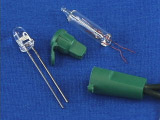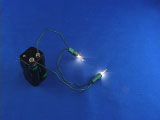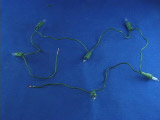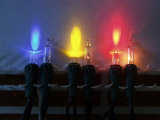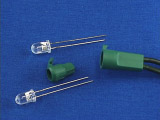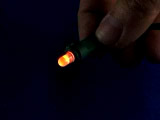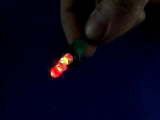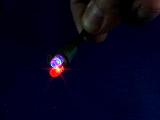
Preparing LED Circuits from Holiday Lights
LEDs are diodes and only conduct electricity in one direction. When powered by alternating current the LED will flash on and off. In this demosntration holiday light circuits are used to power LEDs.
Exchange a holiday light for an LED.Unplug the holiday light strand from the electrical power supply. Pull the light bulb and plastic base straight out of the bulb holder. Remove the light bulb from the base after straightening the bulb wires. Insert the wires of the LED into the holes provided in the base. Trim the wires of the LED so that they extend approximately 1/8". Bend the wires upward using pliers. Push the LED and base into the socket. Do not twist.
LED part numbers (any T-1 3/4, 5 mm LED will work)
www.radioshack.com (web only) bright LEDs with water clear lenses:
RadioShack (in stores or on web) bright LEDs with clear lenses:
Mouser LEDs with water clear lenses:
Unplug the holiday light strand from the electrical power supply. Cut the wire at the base of one socket. Unwrap that wire from the rest of the strand, continuing until you reach a third socket. Cut the off the third socket to leave a 2-socket strand. Strip the insulation from the ends of the wires. Check the circuit using a 6 volt power supply (or 4 AA batteries in a Radio Shack part #27-409 or #27-383 or #27-391 holder.)
Replace no more than half the incandescent bulbs with LEDs (as shown above) when using a 6 volt power supply. (The incandescent bulbs serve as a resistor to limit the amount of current flowing through the LED.) Prepare a 6-socket strand from a longer strand of holiday lights (as shown above for a 2-socket strand but keep unwinding until you have six sockets.) Check the circuit using a 12 volt power supply. A 12 volt alternating current (AC) power supply used for the experiments described below can be obtained from www.radioshack.com part #90-7862, $0.8 (not available in stores).
Replace no more than half the incandescent bulbs with LEDs (as shown above) when using a 12 volt power supply. (The incandescent bulbs serve as a resistor to limit the amount of current flowing through the LED.) A 12 volt power supply is used for the 6-socket strand (as shown above). Examples shown here are a 6-socket light strand containing three blue LEDs, a 6-socket light strand containing three green LEDs, a 6-socket light strand containing three red LEDs, and finally one pair of sockets from each of these. Exchange a holiday light for 2 oppositely aligned LEDs. LEDs have one long and one short lead that indicate electrical polarity. To obtain oppositely aligned LEDs put a short lead from one LED with a long lead from the other LED. Replace one holiday light in a 6-socket strand with a bicolor red and green LED. Power the strand using a 12 volt AC power supply. Rapidly move the LED to spatially separate the alternating colors.
Bicolor LED part number: Radio Shack #900-6127 Replace one holiday light in a 6-socket strand with oppositely aligned red and green LEDs (see above). Power the strand using a 12 volt AC power supply. Rapidly move the LED to spatially separate the alternating colors. Replace one holiday light in a 6-socket strand with oppositely aligned red and blue LEDs (see above). Power the strand using a 12 volt AC power supply. Rapidly move the LED to spatially separate the alternating colors.
Exploring the Nanoworld | MRSEC Nanostructured Interfaces
Copyright © 2013 The Board of Regents of the University of Wisconsin System.
This page created by George Lisensky, Beloit College. Last modified October 27, 2013 .
This page created by George Lisensky, Beloit College. Last modified October 27, 2013 .
